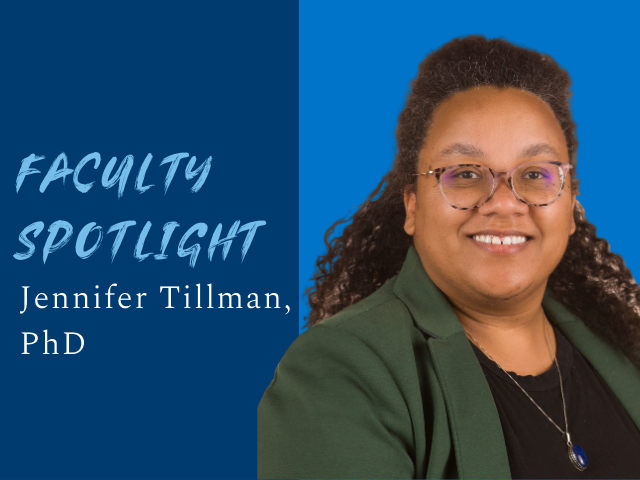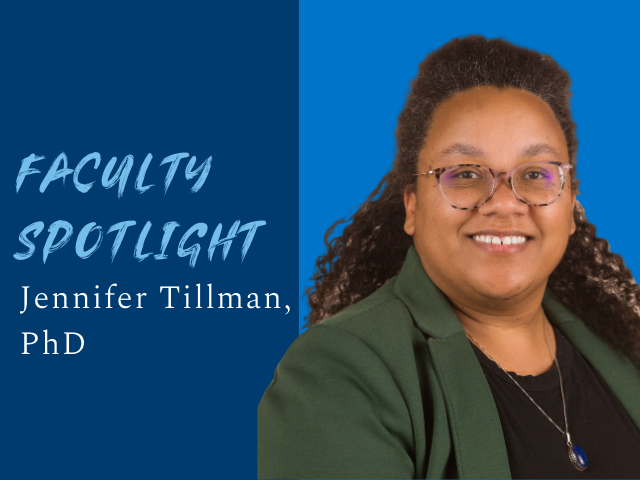Monday, April 15, 2024 Topics: Academic, Faculty
Assistant Professor Jennifer Tillman’s harrowing life experiences led her to pursue academic inquiry into philosophy and medical ethics.
When she was a teenager, her father died of organ failure. Grieving, Tillman asked doctors why she wasn’t on the organ donor list. She got the surprising answer: her father’s life had not been deemed important enough to save.
“That shaped the rest of my life,” Tillman says. “That question of how to treat people fairly is why I do this work. I don’t want this to happen to anyone else.”
Tillman’s research addresses disability and justice, with the aim of rethinking healthcare and devising healthcare policies that meet the needs of different populations. She draws inspiration from philosophers such as Anita Silvers, a medical ethicist and disability rights advocate, and John Rawls, the political philosopher and author of A Theory of Justice, which deals with fundamental rights and egalitarianism.
She is currently working on a paper, “COVID-19, Civil Rights, and People with Disabilities,” which was presented as a workshop at the American Public Health Association Annual Meeting in Atlanta, that explores how care decisions have been made during the global pandemic, how care has been rationed, and how people with disabilities have been denied access to resources.
Tillman also writes about self-esteem, self-worth and health, highlighting how attitudes in medical institutions may lead people with disabilities to avoid treatment for fear of being slighted.
“This is a philosophical view of why there are barriers to accessing health care. Medical institutions create barriers that undermine the self-esteem of people with disabilities, and many health care workers [disabilities] “I don’t understand that,” Tillman said.
Tillman is also in discussions with Professor Gillian Tullis of the Department of Communication Studies and Associate Professor Suzanne Stoltz of the Department of Leadership and Educational Sciences about starting a disability studies minor at San Diego that would bring together disciplines to address disability from multiple perspectives. She is also eager to learn from students, including a small but growing group of students with disabilities.
“Having these conversations with my students is invigorating, and they are very supportive of me in my classes,” she says. “I leave room in the curriculum to accommodate their interests. Many students have never thought about where the barriers are, or the impact of race, gender, etc. One student told me it was the first class she’d ever taken that had the word ‘disability’ in the name. That’s important to me.”
It’s all part of the collaborative spirit within the Faculty of Arts and Sciences, which Tillman says motivates him in his work.
“I love the interdisciplinary discussions. Not only philosophy, but public policy, history and art,” says Tillman, who is currently working on a master’s degree in public health. “That’s what makes USD unique. I feel like I don’t have to stay in just philosophy. I get to work with professors from the nursing school. There’s a real sense of community. When I come here, I feel like I’m part of the university.”
About the Cluster Themes
Climate Change and Environmental Justice: Given the range of disciplinary perspectives for addressing climate change and environmental justice, faculty in this theme shared their interests and expertise and engaged attendees with questions about the impacts of climate change on humanity, the environment, public policy, and the arts.
Technology and the Human Experience: Speakers shared aspects of the University’s promising research program in the study of technology and the human experience, which prepares students to design, create, regulate, and implement accessible and bias-free technology for a diverse world.
Borders and Social Justice: In the spirit of recognizing borders as social, political, cultural, and physical constructs that function as artificial or natural boundaries within and beyond our imaginations, faculty from the College of Arts and Sciences shared their expertise in challenging and refuting the notion of borders.

